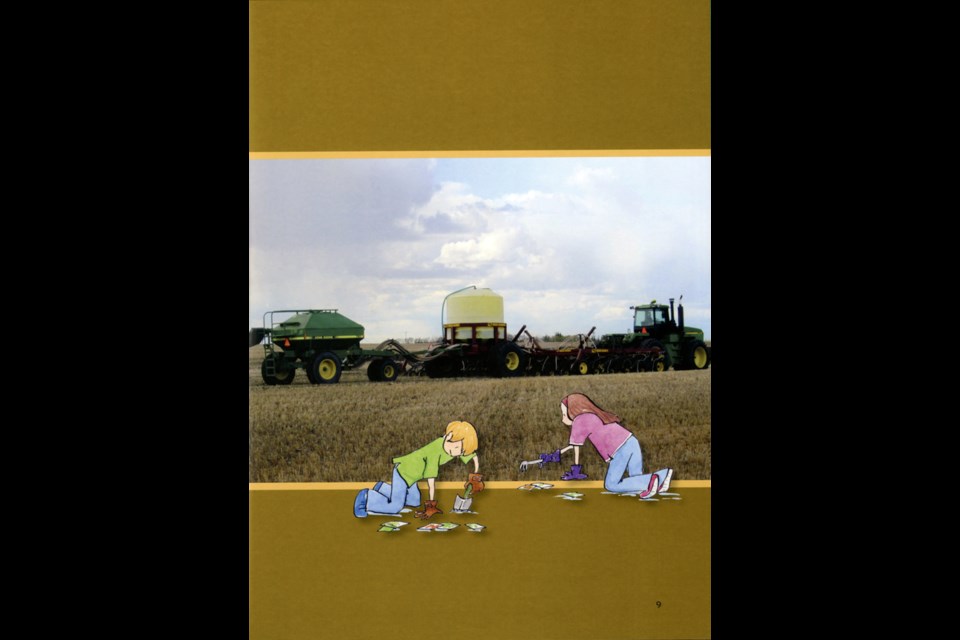Grade 4 students at Columbia School were among students in 161 classrooms to take part in the launch of a new school resource as part of Agriculture Literacy Week in Saskatchewan.
The classrooms were visited Wednesday by presenters reading ‘The Adventures of Michael & Mia: Stewards of the Land’ a new book geared toward teaching students more about where their food comes from.
“We eat every day,” reader Joelle Carlson, an agrologist from Melville told the students.
Carlson pointed to a large 365 she had placed on the chalkboard, and told the students we eat every day of the year “because we need food to fuel our bodies.”
Carlson then asked, “Every day we eat what should we think about?”
The answer was farmers.
Referring to the book, and how it ties into food production, Carlson said, “see how everybody is connect to agriculture in this room,” although not one student lived on a farm.
“So 365 days-a-year, lets thank the farmers,” she said.
After reading to the first class of the day, Carlson was asked why she volunteered as a reader.
“Because I have five children,” she said. “I think it’s important today to teach children about agriculture.”
Carlson said to teach the importance of farming to students you have to make them see how it is important to them/
“Everybody is connected to agriculture,” she reiterated.” Kids are connected to agriculture, you just have to show them that.”
Classroom teach Kendal Hack said the book and the presentation kept her students interested.
“It was very engaging,” she said.
While the book, by author Edward Willet and illustrated by Val Lawton, touched on some technical aspects of agriculture, from the use of global positioning systems for precision farming, to how a riparian area protects natural water ways, Hack said the book brings such concepts back to things young students can grasp. She added Grade 4 is an age when young people are looking to learn new things, so they welcome new concepts well.
“They brought it back down to their level,” she said.
Agricultural education is also part of the Grade 4 curriculum, noted Hack, who said young people do need to learn the source of their food, so incorporating it into the classroom makes sense.
In the case of her class, students attended the Grain Millers Harvest Showdown in Yorkton in November for some hands on experience with farming, and now the classroom reading, which will serve as a springboard into more classroom education until the end of the school year.
Agriculture Literacy Week was March 1 to 7 in the province.
“Agriculture Literacy Week is an opportunity for us to teach our youth about agriculture and food production,” Agriculture Minister Lyle Stewart said in a release at the time of the proclamation. “Many of today’s students grow up disconnected from farms and agriculture. This week provides them with an opportunity to learn about our industry in a fun, interactive way.”
“The Ministry of Education is proud to be supporting Agriculture Literacy Week, as it’s another innovative way to engage our students in their learning,” Education Minister Don Morgan said in the joint release. “This is an excellent way to encourage the literacy skills of our students while also promoting one of Saskatchewan’s most important industries.”
During Agriculture Literacy Week, producers and other members of the agriculture industry gathered in classrooms across the province to read agriculture stories and discuss their experiences in the industry. Their visits are supplemented by materials provided by Agriculture in the Classroom (AITC), such as books and videos.
“Agriculture plays a vital role in our lives, and it’s important that our youth understand that,” AITC Executive Director Sara Shymko said in the release. “Students often learn best when they are able to connect with their subject matter. By introducing them to people directly involved in the agriculture industry, we’re able to help them understand the role agriculture plays in their lives and in the world.”
Agriculture in the Classroom Saskatchewan provides innovative, curriculum-based programs and resources to help increase students’ awareness and understanding of agriculture.

